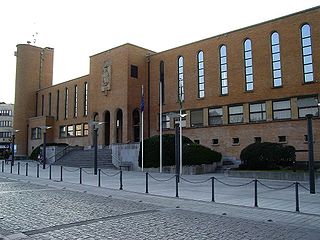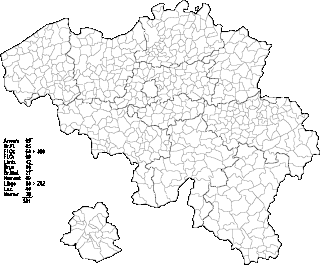Related Research Articles

Brussels, officially the Brussels-Capital Region, is a region of Belgium comprising 19 municipalities, including the City of Brussels, which is the capital of Belgium. The Brussels-Capital Region is located in the central portion of the country and is a part of both the French Community of Belgium and the Flemish Community, but is separate from the Flemish Region (Flanders), within which it forms an enclave, and the Walloon Region (Wallonia), located less than 4 kilometres (2.5 mi) to the south.

The minister-president of the Brussels Capital-Region leads the government of the Brussels-Capital Region of Belgium. The post is appointed for five years along with four ministers and three "state" secretaries. While being the leader of the Brussels Government, the minister-president also is the president of the college of the Common Community Commission.

Belgium is a federal state comprising three communities and three regions that are based on four language areas. For each of these subdivision types, the subdivisions together make up the entire country; in other words, the types overlap.

The Kingdom of Belgium is divided into three regions. Two of these regions, Flanders and Wallonia, are each subdivided into five provinces. The third region, Brussels, does not belong to any province, nor is it subdivided into provinces. Instead, it has amalgamated both regional and provincial functions into a single "Capital Region" administration.

Evere is one of the 19 municipalities of the Brussels-Capital Region (Belgium). As of 1 January 2022, the municipality had a population of 43,608 inhabitants. The total area is 5.08 km2 (1.96 sq mi), which gives a population density of 8,503/km2 (22,020/sq mi). In common with all of Brussels' municipalities, it is legally bilingual (French–Dutch).

Koekelberg is one of the 19 municipalities of the Brussels-Capital Region, Belgium. Located in the north-western part of the region, it is bordered by Berchem-Sainte-Agathe, Ganshoren, Jette, and Molenbeek-Saint-Jean. In common with all of Brussels' municipalities, it is legally bilingual (French–Dutch).

Saint-Josse-ten-Noode or Sint-Joost-ten-Node, often simply called Saint-Josse in French or Sint-Joost in Dutch, is one of the 19 municipalities of the Brussels-Capital Region, Belgium. Located in the north-eastern part of the region, it is bordered by the City of Brussels and Schaerbeek.

Belgium comprises 581 municipalities, 300 of them grouped into five provinces in Flanders and 262 others in five provinces in Wallonia, while the remaining 19 are in the Brussels Capital Region, which is not divided in provinces. In most cases, the municipalities are the smallest administrative subdivisions of Belgium, but in municipalities with more than 100,000 inhabitants, on the initiative of the local council, sub-municipal administrative entities with elected councils may be created. As such, only Antwerp, having over 500,000 inhabitants, became subdivided into nine districts. The Belgian arrondissements, an administrative level between province and municipality, or the lowest judicial level, are in English sometimes called districts as well.

Sint-Genesius-Rode is a municipality in the province of Flemish Brabant, in the Flemish region of Belgium. The municipality only comprises the town of Sint-Genesius-Rode proper, and lies between Brussels and Waterloo in Wallonia. On January 1, 2008, Sint-Genesius-Rode had a total population of 18,021. The total area is 22.77 km2 (8.79 sq mi), which gives a population density of 791/km2 (2,050/sq mi). It borders the Brussels-Capital Region and is essentially a suburb of the city, contiguous with the Prince d'Orange neighbourhood (Uccle), and was a component of the short-lived Arrondissement of Brussels-Periphery. While the Brussels-Capital Region does not have a direct border with Wallonia, the shortest distance between the two is at Sint-Genesius-Rode municipality, with around 4 kilometres (2.5 mi) separating Prince d'Orange and Waterloo along the N5 road.

The City of Brussels is the largest municipality and historical centre of the Brussels-Capital Region, as well as the capital of the French Community of Belgium, the Flemish Region and Belgium. The City of Brussels is also the administrative centre of the European Union, as it hosts a number of principal EU institutions in its European Quarter.

The Flemish Region, usually simply referred to as Flanders, is one of the three regions of Belgium—alongside the Walloon Region and the Brussels-Capital Region. Covering the northern portion of the country, the Flemish Region is primarily Dutch-speaking. With an area of 13,626 km2 (5,261 sq mi), it accounts for only 45% of Belgium's territory, but 58% of its population. It is one of the most densely populated regions of Europe with around 500/km2 (1,300/sq mi).

Saint-Gilles or Sint-Gillis is one of the 19 municipalities of the Brussels-Capital Region, Belgium. Located in the southern part of the region, it is bordered by the City of Brussels, Anderlecht, Forest and Ixelles. In common with all of Brussels' municipalities, it is legally bilingual (French–Dutch), but predominantly French-speaking nowadays.

In Belgium, there are 27 municipalities with language facilities, which must offer linguistic services to residents in Dutch, French, or German in addition to their single official languages. All other municipalities – with the exception of those in the bilingual Brussels region – are monolingual and offer services only in their official languages, either Dutch or French.

The Flemish Community is one of the three institutional communities of Belgium, established by the Belgian constitution and having legal responsibilities only within the precise geographical boundaries of the Dutch-language area and of the bilingual area of Brussels-Capital. Unlike in the French Community of Belgium, the competences of the Flemish Community have been unified with those of the Flemish Region and are exercised by one directly elected Flemish Parliament based in Brussels.

Watermael-Boitsfort or Watermaal-Bosvoorde, often simply called Boitsfort in French or Bosvoorde in Dutch, is one of the 19 municipalities of the Brussels-Capital Region, Belgium. Located in the south-eastern part of the region, it is bordered by Auderghem, the City of Brussels, Ixelles, and Uccle, as well as the Flemish municipalities of Hoeilaart, Overijse and Sint-Genesius-Rode. In common with all of Brussels' municipalities, it is legally bilingual (French–Dutch).

This article outlines the legislative chronology concerning the use of official languages in Belgium.

Brussels-North railway station is one of the three major railway stations in Brussels, Belgium; the other two are Brussels-Central and Brussels-South. Every regular domestic and international train passing there has a planned stop. The station has 200,000 passengers per week, mainly commuters, making it one of the busiest in Belgium.

The government of the Brussels-Capital Region is the political administration of the Brussels-Capital Region of Belgium. An election is held every five years. The government is headed by a Minister-President, four ministers and three state secretaries.

Woluwe-Saint-Lambert or Sint-Lambrechts-Woluwe is one of the 19 municipalities of the Brussels-Capital Region, Belgium. In common with all of Brussels' municipalities, it is legally bilingual (French–Dutch). In French, it is often spelt Woluwé-Saint-Lambert to reflect the Frenchified pronunciation of what was originally a Dutch place name, but the official spelling is without an accent. The Woluwe stream, from which it takes its name, flows through the municipality.
References
- ↑ "Brussels S Train | SNCB". www.belgiantrain.be. Retrieved 2020-05-11.